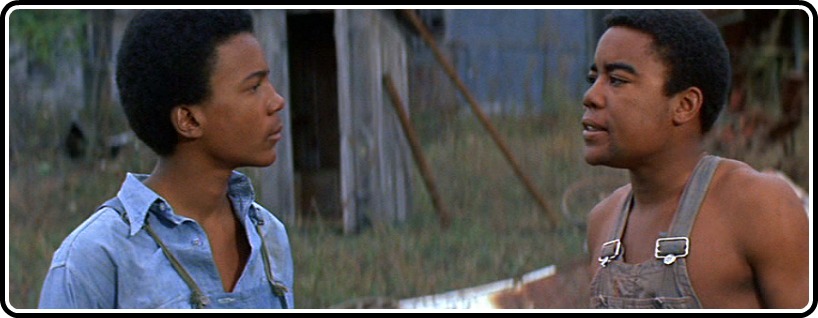It goes without saying that filmmaking is truly a labor of love.
Whether it be a film breaking box office records with a team of writers and a director who is simply there to shoot actors acting, or be it the smallest of small independent film, within any production you will find a person or group of people putting their heart and soul into the film.
This may not be any more clear in the 1969 film, The Learning Tree.
Written and directed by Gordon Parks, the film is based off of a 1964 semi-autobiographical novel of the same name, penned by Parks, and now, 22 years after being selected to join the National Film Registry here in the US, the Warner Archive has brought the public this beloved and absolutely fantastic look at not only growing up, but growing up in a time and world where you aren’t wanted.
Learning tree follows an African American teen named Newt, living in rural Kansas in the late ‘˜20s/early ‘˜30s. Taking the brunt of the era’s racism with a relatively cool and collected demeanor, this plays polar opposite to the way his friend, Marcus, takes these confrontations. After he witnesses a murder, Newt must deal with this new found controversy as well as the information that he himself only knows, and what revealing it could ultimately mean for relations within the town.
Despite some relatively cliché and conventional issues found within this film, 42 years after its release, The Learning Tree is still very much a powerful look at a specific era, yet with conceptual levels that will be able to stand up for another 42.
Visuals are where The Learning Tree truly stands out. Featuring gloriously beautiful cinematography, the visuals may not be in the highest of definitions, but seem to flow ever so poetically from the film’s rather touching narrative. An autobiographical film, The Learning Tree plays a bit stale, particularly in the opening few moments, but is so full of true heart and emotion, that the visuals only seem to bring those feelings from below the surface, to right in the viewers face.
One of the first primarily African American backed films, The Learning Tree is also culturally relevant. Created in a world and time where blacks couldn’t even dream of becoming President, the film is culturally an interesting and really powerful time capsule from a time that couldn’t be more different than the one we live in today. With the screenplay resting safely in the halls of the Library of Congress, this cultural importance has only become more noticeable as well.
That said, there are still quite a few issues.
Starring Kyle Johnson, Alex Clarke, Estelle Evans, Dana Elcar, Mira Waters, Joel Fluellen, Malcolm Atterbury and Richard Ward, the film’s biggest flaw may come in the form of its performances. Not featuring too much grey, the cast’s shining star here is its lead, Johnson, who gives the film its primary heart and soul. With the world surrounding him playing as something much more cartoonish than it likely was when the film was originally released, the performances that make up the film ultimately haven’t aged well. Particularly the turns by Clarke and Ward, both of which may have some truth behind them, but ultimately play much more melodramatic than one would truly hope. For an otherwise lo-fi style project, these performances are far too big and far too in the face of the viewer.
That said, the film as a whole has truly aged like a fine wine.
Despite a few issues with some select performances, the film’s heart and soul oozes off the screen. The film as a whole is a conceptually interesting beast. While many will focus on the idea of race relations that is truly at the heart of this film, it’s the idea of coming of age in a world and time period that you aren’t wanted or appreciated that I think allows this film to not only stand the test of time as a film, but ultimately work for a whole new generation.
Overall, The Learning Tree is a fantastic film, in spite of itself. With a supporting cast that plays much more melodramatic than a film with this much restraint should have, the film is ultimately a beautiful, powerful, and moving film, that ultimately has more than a fair share of awkward and overly dramatic moments. Featuring stunning cinematography, this is not only a great film, but also a cultural landmark that will be just as moving another 42 years from now.
Buy the Learning Tree from WBShop.com




![Bergman Island (The Criterion Collection) [Blu-ray]](https://criterioncast.com/wp-content/uploads/2022/11/bergman-island-the-criterion-collection-blu-ray-400x496.jpg)
![This Is Not a Burial, It’s a Resurrection (The Criterion Collection) [Blu-ray]](https://criterioncast.com/wp-content/uploads/2022/11/this-is-not-a-burial-its-a-resurrection-the-criterion-collection-blu-ray-400x496.jpg)
![Lars von Trier's Europe Trilogy (The Criterion Collection) [The Element of Crime/Epidemic/Europa] [Blu-ray]](https://criterioncast.com/wp-content/uploads/2022/11/lars-von-triers-europe-trilogy-the-criterion-collection-the-element-of-400x496.jpg)
![Imitation of Life (The Criterion Collection) [Blu-ray]](https://criterioncast.com/wp-content/uploads/2022/11/imitation-of-life-the-criterion-collection-blu-ray-400x496.jpg)
![The Adventures of Baron Munchausen (The Criterion Collection) [4K UHD]](https://criterioncast.com/wp-content/uploads/2022/11/the-adventures-of-baron-munchausen-the-criterion-collection-4k-uhd-400x496.jpg)
![Cooley High [Criterion Collection] [Blu-ray] [1975]](https://criterioncast.com/wp-content/uploads/2022/11/cooley-high-criterion-collection-blu-ray-1975-400x496.jpg)
This film was made in my dad’s hometown (Ft. Scott, Kansas) when he was finishing high school; is also the hometown of the director. I grew up a few minutes away in western Missouri, but always heard about this film and have been interested in seeing it.